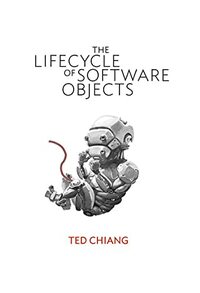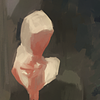Take a photo of a barcode or cover
reflective
fast-paced
Plot or Character Driven:
Character
Strong character development:
Complicated
Loveable characters:
Yes
Flaws of characters a main focus:
Complicated
The two main characters are hired by Blue Gamma (I was reminded of Blue Ant) to help create "digients" - digital entities built on an animal (and then robot) frame. Instead of having programmed behaviors, these learn, and a good portion of the novella explores the impact of that learning.
I was reminded of early AI programming, learning game strategy. It doesn't take much suspension of disbelief to see them developing personalities. Other neat factors include illustrations and Ted Chiang's general descriptions of the future "web".
The book ended quite abruptly, with the future of most characters left unresolved, and this brings the rating down a tad.
I was reminded of early AI programming, learning game strategy. It doesn't take much suspension of disbelief to see them developing personalities. Other neat factors include illustrations and Ted Chiang's general descriptions of the future "web".
The book ended quite abruptly, with the future of most characters left unresolved, and this brings the rating down a tad.
I liked it enough, pretty weird. It's short and fairly slow-paced, and has no major climax. It's well-written enough and the theme is intriguing. Not amazing though, I think it needed more punch.
A very thoughtful novella about Artificial Intelligence pets and being a human. Unexpectedly very emotionally touching. Strongly recommended
This book is incredible. Short, but proper, intelligent SF that doesn't just get you thinking about artificial intelligence, but our relationships with our children, our pets and each other.
This is the first thing by Ted Chiang I've read - I understand from other reviews that it's nowhere near his best work. That's quite a scary proposition.
This is the first thing by Ted Chiang I've read - I understand from other reviews that it's nowhere near his best work. That's quite a scary proposition.
Què puc dir. Havent llegit Stories of Your Life n'esperava bastant més. Tot i així em sembla un bona història per a fer-ne un debat i planteja idees interesants sobre la responsabilitat i el dret a decidir. Tot i no posar-li moltes estrelles, el recomano.
I'm usually a fan of Chiang's work, but this story lacked many things. For starters, it has to be his most lackluster work that I have read (and I've read quite a few). The story happens throughout many years, but the passage of time is only told to us in sentences like "It is a year later, and". I'm not a fan of present-time storytelling to begin with, and this mechanical style of writing doesn't help it at all. The "characters" are at best a bunch of people who can do no wrong, delivering speeches and engaging in conversations without having any chemistry. The plot isn't interesting either, as there is no real climax or denouement.
However, he has some interesting ideas (I'm excluding the part where he excuses bestiality) and makes you think a little bit at least. Still, expected much more of him.
However, he has some interesting ideas (I'm excluding the part where he excuses bestiality) and makes you think a little bit at least. Still, expected much more of him.
My dog died recently. It was peaceful, all things considered: she had some sort of fast-acting cancer, and within a week of the first symptoms, she was at the point where euthanasia was the humane option. She was nearly 16 years old, and had been with me for 15 of those years—my entire adult life, as well as a good portion of my childhood. I don't normally think of myself as a very emotional person, and I'm certainly not the type to cry at funerals, for example; there's truth in that saying that funerals are for the living. I don't care to see a deceased body dressed up to look like a living sleeping one. As soon as the euthanasia had done its job, the thing I was holding had ceased to be the dog I cared so much about for a decade and a half. It was just meat and bone.
I've heard that some people who have insane amounts of money are cloning their pets now. Paris Hilton or somebody cloned one of her dogs, or something. The way the cloning process works is that the animal's DNA is replicated and implanted into a womb, creating a fetus that will be genetically identical to the original model. But the clone won't have the same memories, or preferences, or personality as its "parent." It's an entirely different animal, much in the same way that identical twins—with the exact same genetic structure—are entirely different animals. Cloning is not copying. A living organism is not a piece of technology to be replicated.
Anyway, I don't want a robot dog. Unless I got to work at Boston Dynamics and throw things at it.
I've heard that some people who have insane amounts of money are cloning their pets now. Paris Hilton or somebody cloned one of her dogs, or something. The way the cloning process works is that the animal's DNA is replicated and implanted into a womb, creating a fetus that will be genetically identical to the original model. But the clone won't have the same memories, or preferences, or personality as its "parent." It's an entirely different animal, much in the same way that identical twins—with the exact same genetic structure—are entirely different animals. Cloning is not copying. A living organism is not a piece of technology to be replicated.
Anyway, I don't want a robot dog. Unless I got to work at Boston Dynamics and throw things at it.
Al principio me pareció una idea algo chocante, eso de que la gente del futuro va por la vida conectándose a realidades alternas, con su avatar y todo y comprando mascotas y software inútil, pero es indudable que es un reflejo de ciertos grupos actuales, no solo en cuánto a las "realidades virtuales" sino en cuanto a otros temas que poco a poco aparecen. Desde estas realidades alternas (que bien podrían ser redes sociales), hasta la necesidad de conexión que tantas personas tienen y cómo la satisfacen. En redes sociales, con hijos, con parejas, con mascotas. En grandes comunidades de interacción o en secretivos grupos privados con extrañas costumbres. Cómo a veces esos mundos chocan entre sí, causando conflictos o brindando más conexiones. Cómo siempre habrá alguien que tenga ganas de arruinar la fiesta de otros, o cómo las ideas y creencias de la gente permean su forma de interactuar y tomar decisiones.
Es bastante obvio en algunos puntos el paralelo entre la conducta de algunos personajes con la de padres con diferentes métodos de enseñanza y dueños de mascotas con diferentes niveles de responsabilidad así como los problemas que enfrentan para conseguir lo que ellos consideran el entorno ideal para sus protegidos y establecer cuánta libertad necesitan.
Hay muchos, muchos temas interesantes en la lectura, que además es menos predecible de lo que esperaba. Cerca del final me pareció un poco desesperante, pero es porque llega un punto en que uno prácticamente olvida que se está hablando de software y no de seres vivos. Que es el punto mas interesante de la historia: tiene una forma menos convencional de establecer la inteligencia artificial.
Es bastante obvio en algunos puntos el paralelo entre la conducta de algunos personajes con la de padres con diferentes métodos de enseñanza y dueños de mascotas con diferentes niveles de responsabilidad así como los problemas que enfrentan para conseguir lo que ellos consideran el entorno ideal para sus protegidos y establecer cuánta libertad necesitan.
Hay muchos, muchos temas interesantes en la lectura, que además es menos predecible de lo que esperaba. Cerca del final me pareció un poco desesperante, pero es porque llega un punto en que uno prácticamente olvida que se está hablando de software y no de seres vivos. Que es el punto mas interesante de la historia: tiene una forma menos convencional de establecer la inteligencia artificial.
Very much enjoyed this.
The novella tells the story of what are, essentially, tamagotchi that gain sentience. That they gain sentience isn't a surprise. That their owners take varied stances in response to the affection the tamagotchi inspire. In fact, there are no surprises, per se, except at the most meaningful level, which is the attention to emotions that Chiang pays as he extrapolates out what happens as the owners of the tamagotchi tend to their pets/children/aliens/what-quite-are-they over the course of man, many years. If you think of Isaac Asimov's The Foundation Trilogy as opera, and Charles Stross' Accelerando as a symphony, this is lovely chamber music.
The book is available as a book, but you can also read it for free, as I did, at the publisher's website:
http://subterraneanpress.com/magazine/fall_2010/fiction_the_lifecycle_of_software_objects_by_ted_chiang
The novella tells the story of what are, essentially, tamagotchi that gain sentience. That they gain sentience isn't a surprise. That their owners take varied stances in response to the affection the tamagotchi inspire. In fact, there are no surprises, per se, except at the most meaningful level, which is the attention to emotions that Chiang pays as he extrapolates out what happens as the owners of the tamagotchi tend to their pets/children/aliens/what-quite-are-they over the course of man, many years. If you think of Isaac Asimov's The Foundation Trilogy as opera, and Charles Stross' Accelerando as a symphony, this is lovely chamber music.
The book is available as a book, but you can also read it for free, as I did, at the publisher's website:
http://subterraneanpress.com/magazine/fall_2010/fiction_the_lifecycle_of_software_objects_by_ted_chiang







